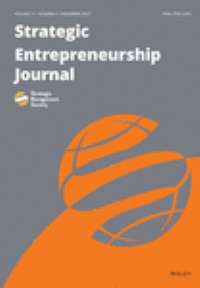全国中学创业内容:对创业生涯的影响
IF 6.3
2区 管理学
Q1 BUSINESS
引用次数: 0
摘要
在1997年的一个议程设置研讨会上,当创业刚刚成为一个严肃的学术领域时,诺贝尔奖获得者肯尼斯·阿罗提出了一个具有挑战性的零假设,即创业是一种随机现象,教育内容不太可能对创业率或成功产生影响。为了开始解决这一空白,我们利用全国范围内的教育改革作为准实验来调查商业和创业导向教育对(i)早期创业(即直接影响)和(ii)毕业后可能导致创业活动的选择(即间接影响)的影响。我们找到了正面的直接和间接影响的证据,并讨论了对未来创业教育政策设计、内容和教师培训研究的启示。名牌大学里有各种各样的创业项目,鼓励学生根据创业的偏好和意图来参加这些项目。由此产生的新企业是创新、经济增长和创造就业的重要驱动力。我们的研究表明,在较早的年龄接触商业和创业内容同样重要。一方面是对创业作为一种职业的现实洞察,从而产生更多高质量的创业公司,另一方面是培养对创业的偏好,影响随后在高等教育和就业方面的选择,有利于未来的创业。我们建议投资于扩大面向所有人的创业教育,而不是针对大学或科技企业家等特定目标群体。本文章由计算机程序翻译,如有差异,请以英文原文为准。
Nationwide entrepreneurship content in secondary schools: Impact on entrepreneurial careers
Research SummaryIn an agenda setting seminar in 1997, when entrepreneurship was just emerging as a serious field of scholarship, Nobel Laureate Kenneth Arrow offered a challenging null hypothesis, namely, that entrepreneurship being a stochastic phenomenon, educational content is unlikely to make a difference in startup rates or success thereafter. With a view to begin tackling this null, we utilize a nationwide educational reform as a quasi‐experiment to investigate the effect of business and entrepreneurship‐oriented education on (i) early age startup (i.e., direct effects) and (ii) postgraduation choices that may lead to startup activity later (i.e., indirect effects). We find evidence for positive direct and indirect effects and discuss implications for future research into the design of entrepreneurship education policies as well as content and teacher training.Managerial SummaryA variety of entrepreneurship programs exist at prestigious universities to stimulate startup for students who enroll in these based on entrepreneurial preferences and intentions. The resulting new ventures created are important drivers of innovation, economic growth, and job creation. Our study indicates that exposure to business and entrepreneurship content at an earlier age is equally important. Both in terms of obtaining a realistic insight into entrepreneurship as a career, leading to more realized startups of high quality but also in terms of developing a preference for entrepreneurship affecting subsequent choices regarding tertiary education and employment in favor of future entrepreneurship. We suggest investments in broadening entrepreneurship education for all in contrast to for specific targeted groups such as university or technology entrepreneurs.
求助全文
通过发布文献求助,成功后即可免费获取论文全文。
去求助
来源期刊

Strategic Entrepreneurship Journal
Multiple-
CiteScore
11.10
自引率
1.60%
发文量
31
期刊介绍:
The Strategic Entrepreneurship Journal is a research journal that publishes original work recommended by a developmental, double-blind review process conducted by peer scholars. Strategic entrepreneurship involves innovation and subsequent changes which add value to society and which change societal life in ways which have significant, sustainable, and durable consequences. The SEJ is international in scope and acknowledges theory- and evidence-based research conducted and/or applied in all regions of the world. It is devoted to content and quality standards based on scientific method, relevant theory, tested or testable propositions, and appropriate data and evidence, all replicable by others, and all representing original contributions. The SEJ values contributions which lead to improved practice of managing organizations as they deal with the entrepreneurial process involving imagination, insight, invention, and innovation and the inevitable changes and transformations that result and benefit society.
 求助内容:
求助内容: 应助结果提醒方式:
应助结果提醒方式:


